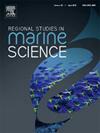Life cycle assessment for environment-friendly ferry service: A case study between South Korea and China
IF 2.4
4区 环境科学与生态学
Q3 ECOLOGY
引用次数: 0
Abstract
The major ports in the three provinces of China’s Northeast serve as crucial logistic hubs for inland cargo from Northeast China and the Far East, and are integral parts of the Maritime Silk Roads. Given the geographic, economic, cultural, and geopolitical significance of Northeast China, South Korea has identified this area as vital. Since 2013, ferry routes have been established, with three of the ten routes originating from the Northeast three provinces of China and terminating in the Incheon Port. This study analyzes the environmental impact of car ferries operating between South Korea and China using Life Cycle Assessment method. The findings indicate that transitioning from Heavy Fuel Oil to Liquefied Natural Gas serves as an effective transitional fuel for the decarbonization of shipping. The study highlights the necessity for technical and policy cooperation to facilitate the construction and deployment of eco-friendly car ferries, including promoting the conversion of South Korea-China ferry routes into green shipping corridors through collaborative efforts such as the South Korea-China Maritime Transportation Meeting. Thus, the study proposes mutual policy and financial support to enable the construction of eco-friendly car ferries in China’s Northeast three provinces, where existing vessels are over 25 years old.
环境友好型渡轮服务的生命周期评价——以中韩两国为例
东北三省主要港口是东北和远东内陆货物的重要物流枢纽,是海上丝绸之路的重要组成部分。考虑到中国东北在地理、经济、文化和地缘政治方面的重要性,韩国认为这一地区至关重要。从2013年开始,10条航线中有3条从中国东北3省出发,以仁川港为终点站。本研究使用生命周期评估法分析韩中两国间营运的汽车轮渡对环境的影响。研究结果表明,从重质燃料油向液化天然气的过渡是航运脱碳的有效过渡燃料。该研究强调了技术和政策合作的必要性,以促进环保汽车渡轮的建设和部署,包括通过韩中海运会议等合作努力,推动韩中轮渡航线转变为绿色航运走廊。因此,该研究建议相互政策和财政支持,使中国东北三省的环保汽车渡轮建设成为可能,这些省份现有船只的船龄超过25年。
本文章由计算机程序翻译,如有差异,请以英文原文为准。
求助全文
约1分钟内获得全文
求助全文
来源期刊

Regional Studies in Marine Science
Agricultural and Biological Sciences-Ecology, Evolution, Behavior and Systematics
CiteScore
3.90
自引率
4.80%
发文量
336
审稿时长
69 days
期刊介绍:
REGIONAL STUDIES IN MARINE SCIENCE will publish scientifically sound papers on regional aspects of maritime and marine resources in estuaries, coastal zones, continental shelf, the seas and oceans.
 求助内容:
求助内容: 应助结果提醒方式:
应助结果提醒方式:


